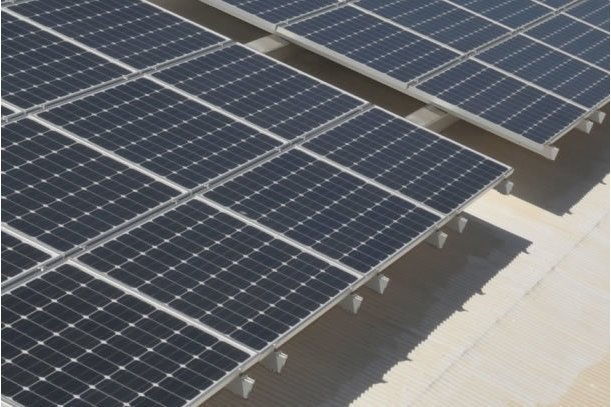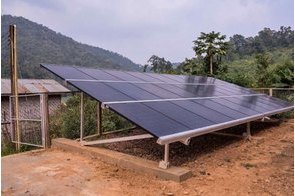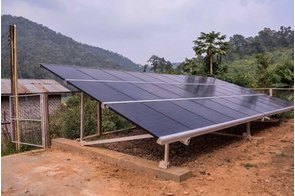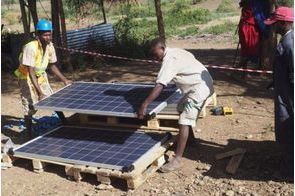Nigeria-focused renewable energy project wins financing contest

Summary
The project seeks equity financing to provide clean energy to telecom infrastructure in Nigeria, using solar mini-grids.
A project owned by First WATT Renewables, a Canada-based clean-energy technology producer and supplier, has won the 4th West African Forum for Climate and Clean Energy Financing (WAFCCEF) contest. The project seeks to raise $4.8 million in equity financing to provide clean energy to telecom infrastructure in Nigeria, using solar mini-grids
The WAFCCEF business plan competition was organised by the Private Financing Advisory Network (PFAN) and hosted by the African Development Bank (AfDB) in Abidjan, Côte d’Ivoire, around the end of last month. First Watt and seven other companies pitched their projects to investors, seeking investment ranging from $1.2 million to $300 million, with a total investment value of close to $400 million.
According to a statement released by AfDB today, the eight projects came from five different countries in the ECOWAS region, namely Côte d’Ivoire, Ghana, Togo, Cameroon and Nigeria. Launched in 2013 by PFAN, the WAFCCEF contest is organised through a partnership of the AfDB, the ECOWAS Centre for Renewable Energy and Energy Efficiency (ECREEE), the ECOWAS Bank for Investment, and Development and the African Biofuel and Renewable Energy Company (ABREC).
"I was very impressed by the quality of the projects submitted. I was also pleased with the positive reactions of the investors attending the event, demonstrating the added value of the PFAN approach to the development and financing of clean energy and climate projects," said Albert Boateng, PFAN coordinator for West Africa.
First WATT’s project, according to the AfDB, is a Special Purpose Vehicle (SPV) set up to isolate financial risk, with a 'take-or-pay' model. This entails an indexed electricity-purchase agreement whereby energy is provided as a service to the buyer, who makes flat-rate monthly payments. According to its initiators, the project eases the transition towards green, sustainable energy production in Nigeria.
Earlier this year, First Watts and Pan African Towers announced an infrastructure investment partnership worth N7.2 billion. The partnership entails Pan African Towers leveraging First Watts Renewable’s green solutions to power its sites instead of relying on diesel-powered conventional generators.
The investment pitch at the competition was made by the firm's Director of Operations, Oluwole Eweje, with support from Chief Investment Officer, Sherisse Alexander.
Among the three runners-up at the contest was Sweep Ghana, a waste-to-energy facility that aims to process 20 percent of Accra’s solid municipal waste to provide enough power for more than 300,000 people. Another runner-up was Dutch & Co, which is helping to bridge the gap between supply and demand for electricity in Africa. The company scales up supply by installing low-energy LED lighting and increases supply using solar PV. The third company, Benoo Energies, is seeking $1.3 million to build 500 solar energy kiosks for productive use in rural Togo.
"WAFCCEF plays a crucial role in developing the next generation of clean energy entrepreneurs on the continent and serves as a link with investment initiatives by the African Development Bank and other financial institutions," said Daniel Schroth, acting director of AfDB’s renewable energy and energy efficiency department. "We have previously supported other WAFCCEF winners through the Sustainable Energy Fund for Africa (SEFA) and we hope to be able to select some additional projects for the Bank's pipeline."
The PFAN – a network consisting of more than 150 experts in climate funding and clean energy from around the world – offers free business coaching and investor matchmaking services to entrepreneurs developing promising climate adaptation and clean energy projects in low- and middle-income countries. Projects that have received support from PFAN have leveraged over $1.6 billion to date.
The programme is hosted by the United Nations Industrial Development Organization (UNIDO) and the Renewable Energy and Energy Efficiency Partnership (REEEP) in Vienna. It is also supported by the governments of Australia, Japan, Norway, Sweden and the USA, and by the Kigali Cooling Efficiency Program (K-CEP).
The first WAFCCEF competition was won by a Nigerian start-up, SMEFUNDS (Small and Medium Entrepreneurship Fundamentals – Green Energy & Biofuels). The firm is behind the first production of cooking fuels in the form of a bio-ethanol gel made from plant waste. In 2014, the company received a $580,000 grant from SEFA to finance technical studies, legal and financial advisory services and a full environmental and social impact assessment. An Ivorian company, Ivoire Hydro Energy, won the contest in 2015. The winner in 2018 was a Sierra Leonean company, Masada Waste Transformers.
Related
-
AfDB’s SE4All Africa Hub to support green mini-grid developers
The SE4All Africa Hub is developing a programme to scale up investments in commercially viable green mini-grid projects.
-
IEC launches regional centre to increase electricity access in Africa
A reliable electricity supply in Africa will improve basic service such as healthcare.
-
ENGIE to become market leader in off-grid solar in Africa
With the acquisition of Mobisol, ENGIE will be offering solar home systems in additional three African countries.







